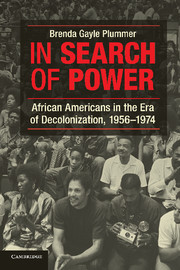Book contents
- Frontmatter
- Contents
- Figures
- Introduction
- 1 A Great Restlessness
- 2 Peace or a Sword?
- 3 “Freedom’s Struggle Crosses Oceans and Mountains”
- 4 Meeting Odinga
- 5 When Race Doesn’t Matter
- 6 Embracing the Globe
- 7 Race, Space, and Displacement
- 8 Africa and Liberation
- 9 Agenda Setting on Two Continents
- Conclusion
- Bibliography
- Index
- References
2 - Peace or a Sword?
Published online by Cambridge University Press: 05 December 2012
- Frontmatter
- Contents
- Figures
- Introduction
- 1 A Great Restlessness
- 2 Peace or a Sword?
- 3 “Freedom’s Struggle Crosses Oceans and Mountains”
- 4 Meeting Odinga
- 5 When Race Doesn’t Matter
- 6 Embracing the Globe
- 7 Race, Space, and Displacement
- 8 Africa and Liberation
- 9 Agenda Setting on Two Continents
- Conclusion
- Bibliography
- Index
- References
Summary
If many Capahosic participants had ties to an older, traditional GOP and retained a quid pro quo approach to politics, more internationally minded Republicans began to rival Democrats in looking outward at a global environment in transition. They looked for counsel to such figures as Harvard professor Henry Kissinger, for whom Urban League director Lester Granger wrote a policy paper during the Eisenhower years. Kissinger had directed a seminar focused on the status of the United States in the world. Granger’s contribution, “The Racial Factor in International Relations,” advocated decolonization and racial reform. Granger used conventional cold war arguments to suggest approaches for improving the United States’ image. He called for a coherent State Department program for foreign visitors of color and recommended removing materials in United States Information Agency (USIA) libraries that denigrated African Americans. Granger placed considerable emphasis on propaganda work, including “good will missions,” foreign aid, and the integration of the Foreign Service.
In line with the Urban League’s focus on placing minority candidates in jobs, his recommendations leaned heavily on the appointment of “American Negroes of high qualification” for overseas posts. He expressed skepticism, however, about sending popular black entertainers on foreign tours. Granger “seriously questioned,” for instance, whether having jazz trumpeter Louis Armstrong play before a “shouting, swaying, rocking and rolling Gold Coast audience,” advanced the best interests of the United States. Instead of Satchmo’s sweaty vulgarity, the punctilious Granger believed, “skillful, well-trained and highly intelligent” blacks would be far more appropriate representatives. The Urban League director’s disdain for such authentic expressions of African-American culture as jazz was not rare at the time.
- Type
- Chapter
- Information
- In Search of PowerAfrican Americans in the Era of Decolonization, 1956–1974, pp. 62 - 96Publisher: Cambridge University PressPrint publication year: 2012



